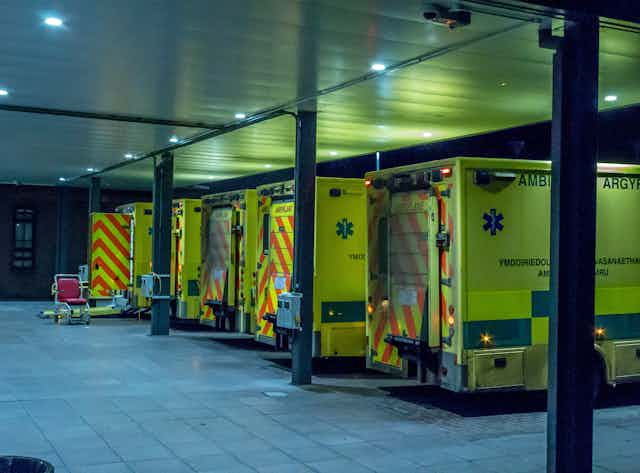More nurses, more hospitals and more GPs, these were the 2019 general election promises made by the now government.
That the NHS is in the midst of a staffing crisis is clear. As an academic with a background in acute and emergency care, I’ve seen first-hand that not enough nurses are being trained – with 44,000 unfilled vacancies for nurses in the UK.
A high number of nurses who are EU and non-EU nationals have already left the NHS in advance of Brexit. And as a recent Health Foundation report noted, the current shortfall in nurse numbers is being filled by clinical support staff.
But it was my recent experiences of the NHS as an emergency patient that really brought home to me the knock-on effects of this staffing crisis.
Read more: Shortage of nurses in UK is affecting patient care and threatening lives
Changing face of ‘nursing’
The relentless cuts to the NHS training budget have resulted in a significant and permanent shift in the way healthcare is now delivered. This means the traditional view of a “nurse” has had to change.
Nursing training has evolved over the years, with much more focus upon clinical decision-making. The majority of the “hands on” day-to-day care of patients is now devolved to healthcare assistants. Indeed, research from 2018 by the union Unison found almost two-thirds of healthcare assistants are performing roles usually undertaken by nurses.
The findings, based on a survey of nearly 2,000 healthcare assistants across the UK, also found that over half say they have not received adequate training for performing tasks such as dressing wounds or giving out medication.

Read more: NHS reliance on EU staff in numbers – full scale of Brexit risk revealed
The harsh reality is that the days of wards staffed predominantly by nurses have gone. With fewer junior doctors in training, nurses with additional specialist training now regularly carry out roles that were traditionally the preserve of medicine. And with fewer nurses, nursing support roles – such as the nurse associate and healthcare assistant – take on tasks that were originally the domain of nurses.
This is concerning as a University of Southampton study from 2016 found that for every 25 patients, substituting just one nurse for clinical support staff was associated with a 21% rise in the risk of patient harm.
‘Very basic training’
I recently found myself lying on a trolley in my local hospital’s emergency department after my appendix burst. During my time in hospital, I came into contact with a small number of highly skilled and presumably well paid medical staff who had access to sophisticated technical equipment – and who effectively saved my life.
But the surgical ward itself was largely staffed by healthcare assistants with very basic training. And I was taken aback by the small number of nurses on what was clearly a busy ward. The nurses that were there were always rushing around looking harassed – highlighting how years of chronic underinvestment in the NHS have taken their toll.
As a teacher and researcher in this area, I strongly believe the UK needs a health and social care workforce that is specifically designed to meet the needs of an ageing population with increasingly complex needs.
What needs to be done?
The NHS workforce reconfiguration so far has been an accountant’s response – designed to save money rather than being based upon actual clinical need. New investment into the NHS needs to be directed to where it’s actually needed: developing the workforce.
Big promises have been made by the government, but even if the new parliament lasts until 2024, political expediency will look at the cheapest and quickest way to make an impact before the next general election. This must not be allowed to happen.
Encouraging health professionals from both EU and non-EU countries to come back to the NHS would be one way to tackle the problem. As it would at least help to reverse some of the decline in nursing numbers. But proposed visa changes and the increased NHS treatment surcharge for overseas health workers could make matters worse.
Beyond election promises, it’s clear an urgent discussion over the workforce requirements of the NHS is now needed. And the government must ensure the future NHS workforce is genuinely fit for purpose – people’s lives depend on it.

